Type 2 Diabetes Management for Adults
Medically reviewed by Drugs.com. Last updated on Aug 4, 2025.
Type 2 diabetes is a disease that affects how your body uses glucose (sugar). When the blood sugar level increases, the pancreas should make more insulin. Insulin helps move sugar out of the blood so it can be used for energy. Type 2 diabetes develops because either the body cannot make enough insulin, or it cannot use the insulin correctly. Management will help you feel well and enjoy your daily activities. Your diabetes care team providers can help you make a plan to fit diabetes care into your schedule. Your plan can change over time to fit your needs and your family's needs.
 |
DISCHARGE INSTRUCTIONS:
Have someone call your local emergency number (911 in the US) if:
- You cannot be woken.
- You have signs of diabetic ketoacidosis:
- confusion, fatigue
- vomiting
- rapid heartbeat
- fruity smelling breath
- extreme thirst
- dry mouth and skin
- You have any of the following signs of a heart attack:
- Squeezing, pressure, or pain in your chest
- You may also have any of the following:
- Discomfort or pain in your back, neck, jaw, stomach, or arm
- Shortness of breath
- Nausea or vomiting
- Lightheadedness or a sudden cold sweat
- You have any of the following signs of a stroke:
- Numbness or drooping on one side of your face
- Weakness in an arm or leg
- Confusion or difficulty speaking
- Dizziness, a severe headache, or vision loss
Call your doctor or diabetes care team provider if:
- You have a sore or wound that will not heal.
- You have a change in the amount you urinate.
- Your blood sugar levels are higher than your target goals.
- You often have lower blood sugar levels than your target goals.
- Your skin is red, dry, warm, or swollen.
- You have trouble coping with diabetes, or you feel anxious or depressed.
- You have trouble following any part of your care plan, such as your meal plan.
- You have questions or concerns about your condition or care.
What you need to know about high blood sugar levels:
High blood sugar levels may not cause any symptoms. You may feel more thirsty or urinate more often than usual. Over time, high blood sugar levels can damage your nerves, blood vessels, tissues, and organs. The following can increase your blood sugar levels:
- Large meals or large amounts of carbohydrates at one time
- Less physical activity
- Stress
- Illness
- A lower dose of diabetes medicine or insulin, or a late dose
Related medications
What you need to know about a low blood sugar level:
Symptoms include feeling shaky, dizzy, irritable, or confused. You can prevent symptoms by keeping your blood sugar levels from going too low.
- Treat a low blood sugar level right away:
- Drink 4 ounces of juice or have 1 tube of glucose gel.
- Check your blood sugar level again 10 to 15 minutes later.
- When the level goes back to normal, eat a meal or snack to prevent another decrease.

- Keep glucose gel, raisins, or hard candy with you at all times to treat a low blood sugar level.
- Your blood sugar level can get too low if you take diabetes medicine or insulin and do not eat enough food.
- If you use insulin, check your blood sugar level before you exercise.
- If your blood sugar level is below 100 mg/dL, eat 4 crackers or 2 ounces of raisins, or drink 4 ounces of juice.
- Check your level every 30 minutes if you exercise longer than 1 hour.
- You may need a snack during or after exercise.
What you can do to manage your blood sugar level:
- Check your blood sugar level as directed and as needed. You will be given information on when and how to check your blood sugar level. Your healthcare provider will help you create a blood sugar level range. The goal is to keep your blood sugar within the range so it does not go too high or too low. Make a list of the times you checked your blood sugar level and the results of your checks. Take the list to all follow-up appointments.
- A glucose meter is a device that uses a test strip to check your blood sugar level. You put a small drop of blood from a finger on the test strip. The strip is put into the device. The device then figures out how much sugar is in your blood.
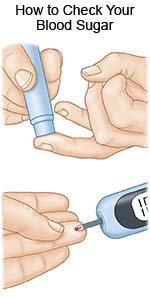
- A continuous glucose monitor (CGM) uses a sensor to check your blood sugar level. The sensor is placed on your abdomen or arm. A transmitter on the sensor gets a glucose reading. CGM data may be linked to an insulin pump. The data will help you and your provider see if your levels stayed within range. Your provider may recommend nutrition, physical activity, or medicine changes if your levels were often above or below range.
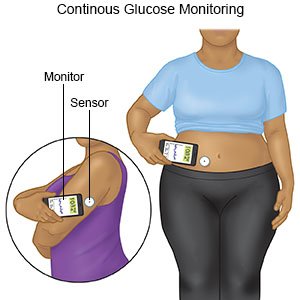
- A glucose meter is a device that uses a test strip to check your blood sugar level. You put a small drop of blood from a finger on the test strip. The strip is put into the device. The device then figures out how much sugar is in your blood.
- Make healthy food choices. The goal for blood sugar levels before meals is between 80 and 130 mg/dL. The goal 2 hours after meals is lower than 180 mg/dL. Work with a dietitian to create a meal plan that works for you and your schedule. A dietitian can help you learn how to eat the right amount of carbohydrates (sugar and starchy foods) during your meals and snacks. Examples of carbohydrates are breads, cereals, rice, pasta, fruit, low-fat dairy, and sweets. Carbohydrates can raise your blood sugar level if you eat too many at one time.

- Eat high-fiber foods as directed. Fiber helps improve blood sugar levels. Fiber also lowers your risk for heart disease and other problems diabetes can cause. Examples of high-fiber foods include vegetables, whole-grain bread, and beans such as pinto beans. Your dietitian can tell you how much fiber to have each day.

- Get regular physical activity. Physical activity can help you get to your target blood sugar level goal and manage your weight. Get at least 150 minutes of moderate to vigorous aerobic physical activity each week. Resistance training, such as lifting weights, should be done 3 times each week. Do not miss more than 2 days of physical activity in a row. Do not sit longer than 30 minutes at a time. Your healthcare provider can help you create an activity plan. The plan can include the best activities for you and can help you build your strength and endurance.


- Maintain a healthy weight. Ask your team what a healthy weight is for you. A healthy weight can help you control diabetes and prevent heart disease. Ask your team to help you create a weight-loss plan, if needed. Even a loss of 3% to 7% of your excess body weight can help make a difference in managing diabetes. Your team will help you set a weight-loss goal, such as 10 to 15 pounds, or 5% of your extra weight. Together you and your team can set manageable weight-loss goals.
- Talk to your provider about weight loss medicines, if needed. These medicines are not used to lower blood sugar, but your level may decrease from weight loss. Your provider may recommend you continue taking the medicine even after you finish losing extra weight. Along with maintaining a healthy weight, these medicines can help protect your heart and kidneys.
- Use non-insulin diabetes medicine as directed. Non-insulin diabetes medicines help control your blood sugar level and may help you maintain a healthy weight. Most of these medicines are taken by mouth. Some are injected daily or weekly. You may need more than 1 medicine, depending on your A1c results over time.
- Use insulin as directed. Insulin may be used or added if non-insulin diabetes medicine becomes less effective. You will learn how much insulin you need and when to use it. You will also be taught how to match insulin with blood sugar levels, activity, and carbohydrates. Insulin may be given through a pump or pen, or injected. You and your care team will discuss the best method for you:
- An insulin pump is a wearable medical device that gives continuous insulin. An insulin pump prevents the need for multiple insulin injections in a day.
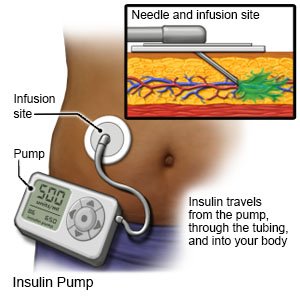
- An insulin pen is a device prefilled with insulin. Most insulin pens are disposable. You throw the pen away after it is empty or used for a certain amount of time. Some pens have a replaceable cartridge filled with insulin. You keep the pen and only throw away the cartridge.
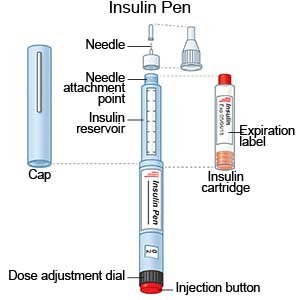
- Insulin injections are given with a needle and syringe. You and your family members will be taught how to draw up and give insulin if this is the best method for you. You will also be taught how to dispose of used needles and syringes.
- An insulin pump is a wearable medical device that gives continuous insulin. An insulin pump prevents the need for multiple insulin injections in a day.
More ways to manage type 2 diabetes:
- Wear medical alert identification. Wear medical alert jewelry or carry a card that says you have diabetes. Ask your provider where to get these items.
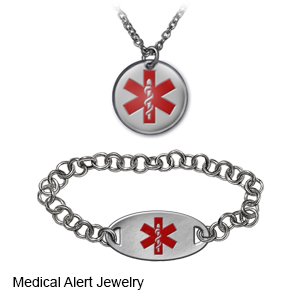
- Do not smoke. Nicotine and other chemicals in cigarettes and cigars can cause lung and blood vessel damage. It also makes it more difficult to manage your diabetes. Ask your provider for information if you currently smoke and need help to quit. Do not use e-cigarettes or smokeless tobacco in place of cigarettes or to help you quit. They still contain nicotine.
- Check your feet each day for cuts, scratches, calluses, or other wounds. Look for redness and swelling, and feel for warmth. Wear shoes that fit well. Check your shoes for rocks or other objects that can hurt your feet. Do not walk barefoot or wear shoes without socks. Wear cotton socks to help keep your feet dry.

- Ask about vaccines you may need. You have a higher risk for serious illness if you get the flu, pneumonia, COVID-19, or hepatitis. Ask your provider if you should get vaccines to prevent these or other diseases, and when to get the vaccines.
- Talk to your provider if you become stressed about diabetes care. Sometimes being able to fit diabetes care into your life can cause increased stress. The stress can cause you not to take care of yourself properly. Your provider can help by offering tips about self-care. A mental health provider can listen and offer help with self-care issues. Other types of counseling can help you make nutrition or physical activity changes.
- Have your A1c checked as directed. Your provider may check your A1c every 3 months, or 2 times each year if your diabetes is controlled. An A1c test shows the average amount of sugar in your blood over the past 2 to 3 months. Your provider will tell you what your A1c level should be.
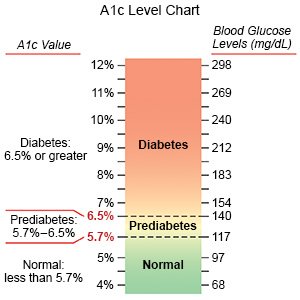
- Have screening tests as directed. Your provider may recommend screening for complications of diabetes and other conditions that may develop. Some screenings may begin right away and some may happen within the first 5 years of diagnosis:
- Examples of diabetes complications include kidney problems, high cholesterol, high blood pressure, blood vessel problems, eye problems, and sleep apnea. Diabetes also increases your risk for liver problems, hormone problems, and bone fractures.
- You may be screened for a low vitamin B level if you take oral diabetes medicine for a long time.
- You may be screened for polycystic ovarian syndrome (PCOS) if you are of childbearing age.
Follow up with your doctor or diabetes care team providers as directed:
You may need to have blood tests done before your follow-up visit. The test results will show if changes need to be made in your treatment or self-care. Talk to your provider if you cannot afford your medicine. Write down your questions so you remember to ask them during your visits.
© Copyright Merative 2025 Information is for End User's use only and may not be sold, redistributed or otherwise used for commercial purposes.
The above information is an educational aid only. It is not intended as medical advice for individual conditions or treatments. Talk to your doctor, nurse or pharmacist before following any medical regimen to see if it is safe and effective for you.
Further information
Always consult your healthcare provider to ensure the information displayed on this page applies to your personal circumstances.
